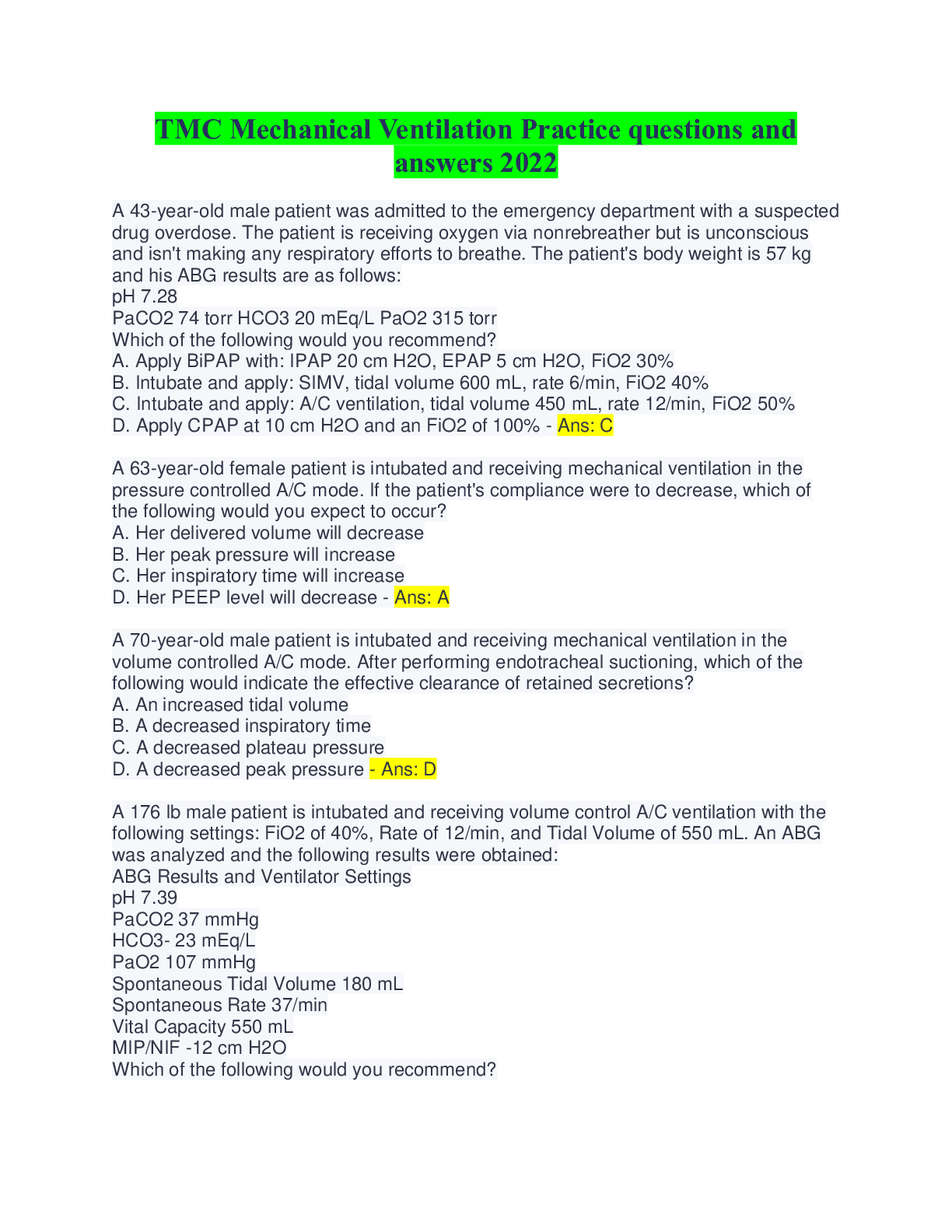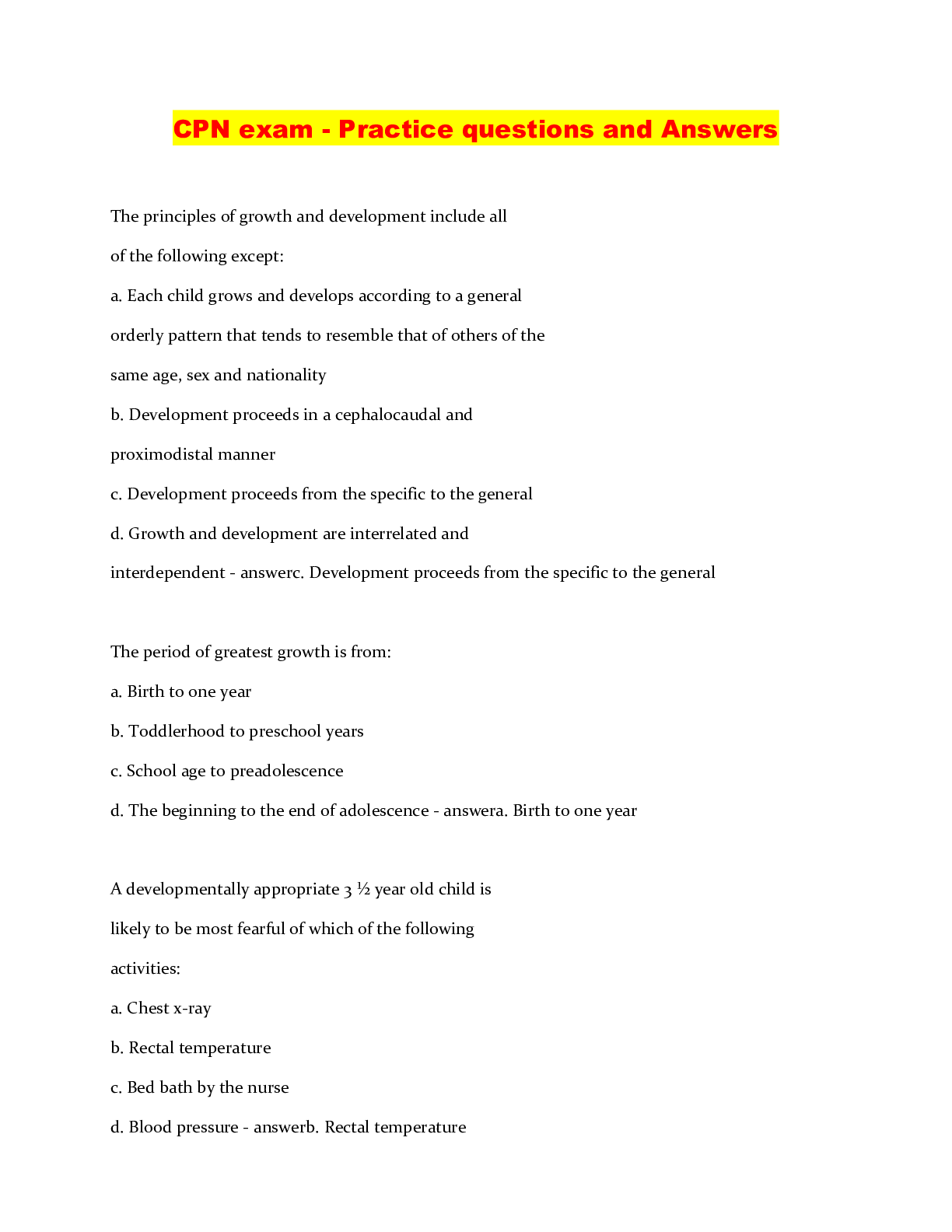Health Care > QUESTIONS & ANSWERS > HESI Prep - Health Assessment Practice Questions and answers 2022 (All)
HESI Prep - Health Assessment Practice Questions and answers 2022
Document Content and Description Below
1. In an interview, the nurse may find it necessary to take notes to aid his or her memory later. Which statement is true regarding note-taking? A) Note-taking may impede the nurse's observation of ... the patient's nonverbal behaviors. B) Note-taking allows the patient to continue at his or her own pace as the nurse records what is said. C) Note-taking allows the nurse to shift attention away from the patient, resulting in an increased comfort level. D) Note-taking allows the nurse to break eye contact with the patient, which may increase his or her level of comfort. - A) Note-taking may impede the nurse's observation of the patient's nonverbal behaviors. Page: 31 Some use of history forms and note-taking may be unavoidable. But be aware that note-taking during the interview has disadvantages. It breaks eye contact too often, and it shifts attention away from the patient, which diminishes his or her sense of importance. It also may interrupt the patient's narrative flow, and it impedes the observation of the patient's nonverbal behavior. 2. During an interview, the nurse states, "You mentioned shortness of breath. Tell me more about that." Which verbal skill is used with this statement? A) Reflection B) Facilitation C) Direct question D) Open-ended question - D) Open-ended question Page: 32 The open-ended question asks for narrative information. It states the topic to be discussed but only in general terms. The nurse should use it to begin the interview, to introduce a new section of questions, and whenever the person introduces a new topic. 3. A nurse is taking complete health histories on all of the patients attending a wellness workshop. On the history form, one of the written questions asks, "You don't smoke, drink, or take drugs, do you?" This question is an example of: A) talking too much. B) using confrontation. C) using biased or leading questions. D) using blunt language to deal with distasteful topics. - C) using biased or leading questions. Page: 36 This is an example of using leading or biased questions. Asking, "You don't smoke, do you?" implies that one answer is "better" than another. If the person wants to please someone, he or she is either forced to answer in a way corresponding to their implied values or is made to feel guilty when admitting the other answer. 4. During an interview, a parent of a hospitalized child is sitting in an open position. As the interviewer begins to discuss his son's treatment, however, he suddenly crosses his arms against his chest and crosses his legs. This would suggest that the parent is: A) just changing positions. B) more comfortable in this position. C) tired and needs a break from the interview. D) uncomfortable talking about his son's treatment. - D) uncomfortable talking about his son's treatment. Page: 37 Note the person's position. An open position with the extension of large muscle groups shows relaxation, physical comfort, and a willingness to share information. A closed position with the arms and legs crossed tends to look defensive and anxious. Note any change in posture. If a person in a relaxed position suddenly tenses, it suggests possible discomfort with the new topic. 5. The nurse is interviewing a patient who has a hearing impairment. What techniques would be most beneficial in communicating with this patient? A) Determine the communication method he prefers. B) Avoid using facial and hand gestures because most hearing-impaired people find this degrading. C) Request a sign language interpreter before meeting with him to help facilitate the communication. D) Speak loudly and with exaggerated facial movement when talking with him because this helps with lip reading. - A) Determine the communication method he prefers. Pages: 40-41 The nurse should ask the deaf person the preferred way to communicate—by signing, lip reading, or writing. If the person prefers lip reading, then the nurse should be sure to face him or her squarely and have good lighting on the nurse's face. The nurse should not exaggerate lip movements because this distorts words. Similarly, shouting distorts the reception of a hearing aid the person may wear. The nurse should speak slowly and should supplement his or her voice with appropriate hand gestures or pantomime. 6. The nurse is performing a health interview on a patient who has a language barrier, and no interpreter is available. Which is the best example of an appropriate question for the nurse to ask in this situation? A) "Do you take medicine?" B) "Do you sterilize the bottles?" C) "Do you have nausea and vomiting?" D) "You have been taking your medicine, haven't you?" - A) "Do you take medicine?" Page: 46 In a situation where there is a language barrier and no interpreter available, use simple words avoiding medical jargon. Avoid using contractions and pronouns. Use nouns repeatedly and discuss one topic at a time. 7. A female patient does not speak English well, and the nurse needs to choose an interpreter. Which of the following would be the most appropriate choice? A) A trained interpreter B) A male family member C) A female family member D) A volunteer college student from the foreign language studies department - A) A trained interpreter Page: 46 whenever possible, the nurse should use a trained interpreter, preferably one who knows medical terminology. In general, an older, more mature interpreter is preferred to a younger, less experienced one, and the same gender is preferred when possible. 8. The nurse is conducting an interview. Which of these statements is true regarding open-ended questions? Select all that apply. A) They elicit cold facts. B) They allow for self-expression. C) They build and enhance rapport. D) They leave interactions neutral. E) They call for short one- to two-word answers. F) They are used when narrative information is needed. - B) They allow for selfexpression. C) They build and enhance rapport. F) They are used when narrative information Page: 32 Open-ended questions allow for self-expression, build rapport, and obtain narrative information. These features enhance communication during an interview. The other statements are appropriate for closed or direct questions. 9. The nurse is conducting an interview in an outpatient clinic and is using a computer to record data. Which is the best use of the computer in this situation? Select all that apply. A) Collect the patient's data in a direct, face-to-face manner. B) Enter all the data as the patient states it. C) Ask the patient to wait as the nurse enters data. D) Type the data into the computer after the narrative is fully explored. E) Allow the patient to see the monitor during typing. - A) Collect the patient's data in a direct, face-to-face manner. D) Type the data into the computer after the narrative is fully explored. E) Allow the patient to see the monitor during typing. Page: 32 The use of a computer can become a barrier. The nurse should begin the interview as usual by greeting the patient, establishing rapport, and collecting the patient's narrative story in a direct face-to-face manner. Only after the narrative is fully explored should the nurse type data into the computer. When typing, the nurse should position the monitor so that the patient can see it. 10. During an assessment, the nurse notices that a patient is handling a small charm that is tied to a leather strip around his neck. Which action by the nurse is appropriate? A) Ask the patient about the item and its significance. B) Ask the patient to lock the item with other valuables in the hospital's safe. C) Tell the patient that a family member should take valuables home. D) No action is necessary. - A) Ask the patient about the item and its significance. Page: 21 The nurse should inquire about the amulet's meaning. Amulets, such as charms, are often seen as an important means of protection from "evil spirits" by some cultures [Show More]
Last updated: 1 year ago
Preview 1 out of 39 pages

Reviews( 0 )
Document information
Connected school, study & course
About the document
Uploaded On
Jul 13, 2022
Number of pages
39
Written in
Additional information
This document has been written for:
Uploaded
Jul 13, 2022
Downloads
0
Views
40

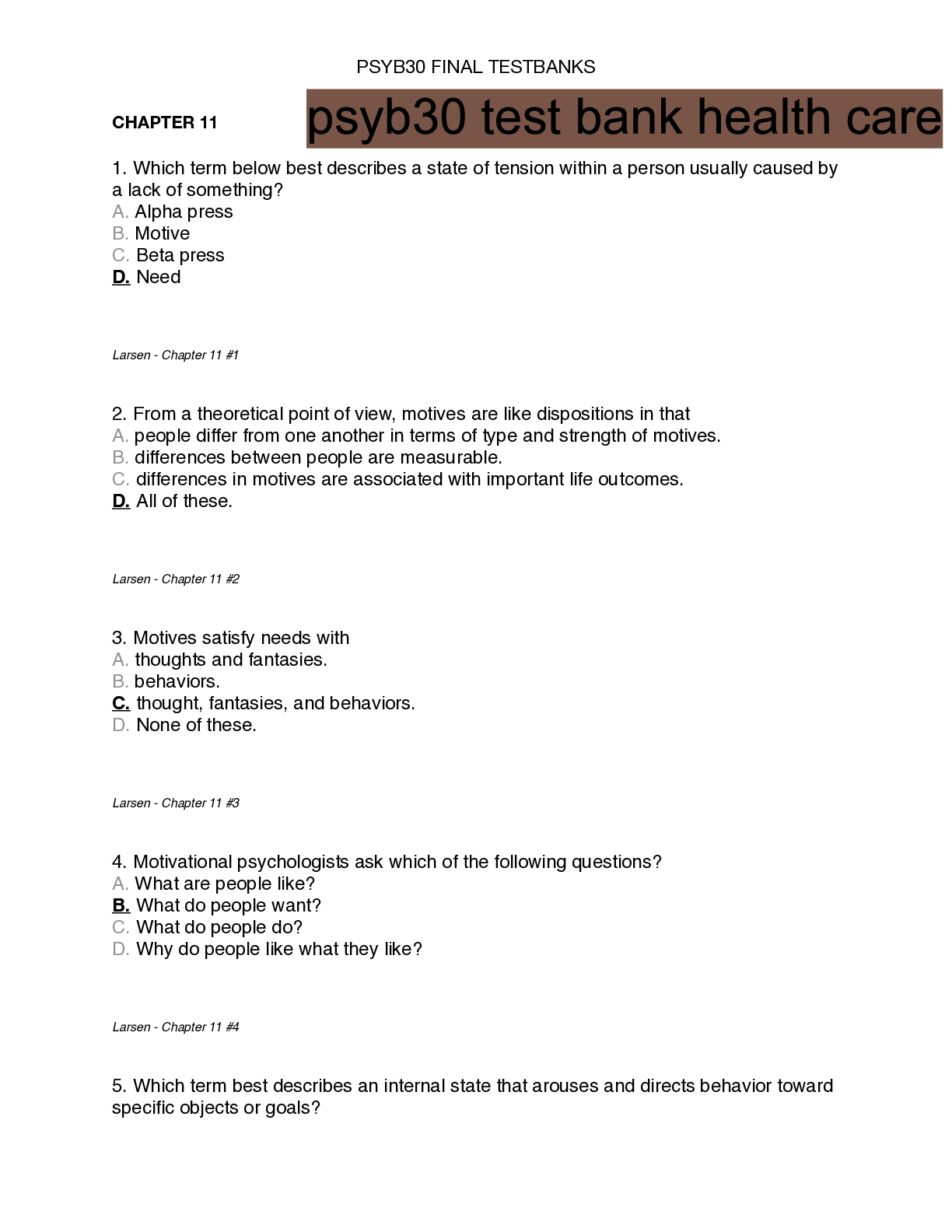
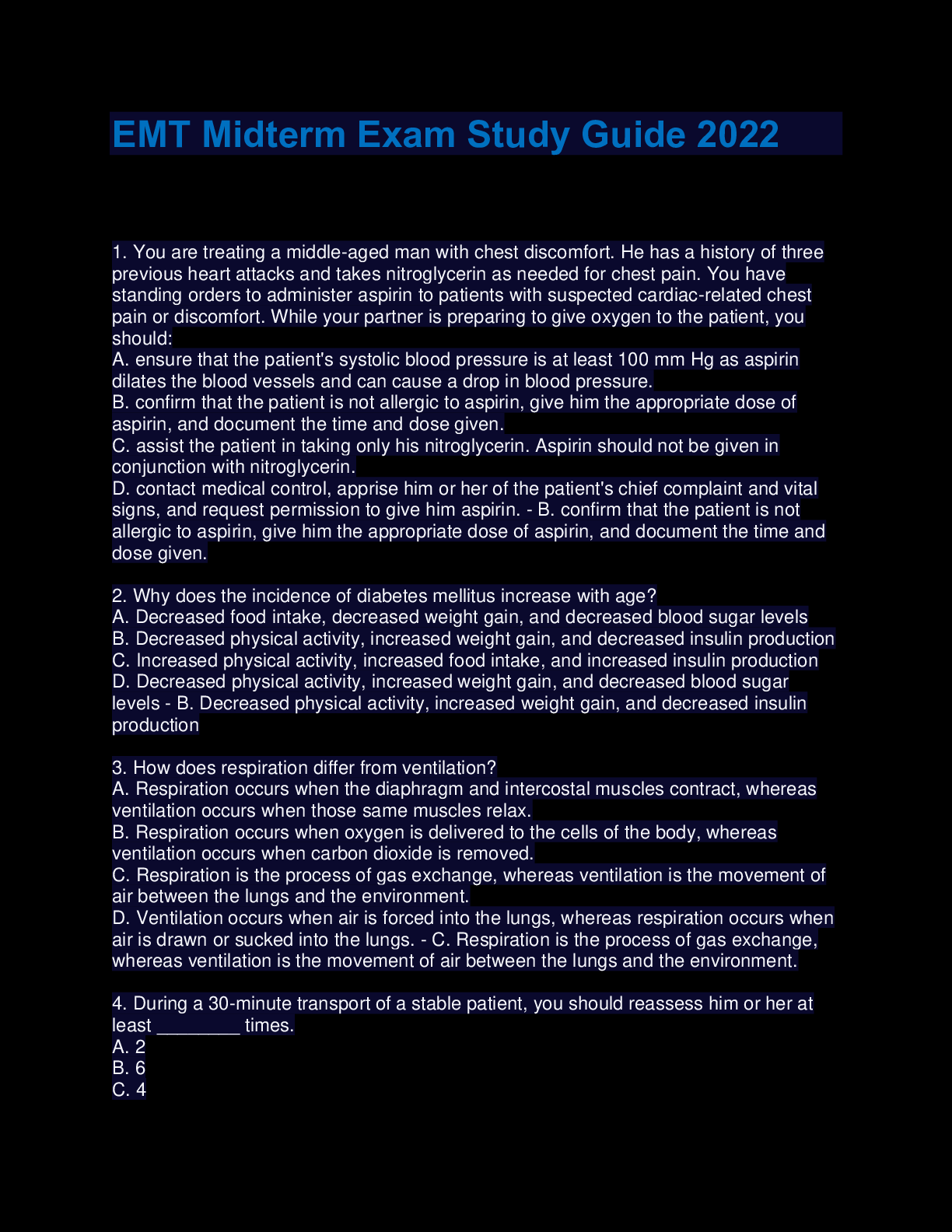
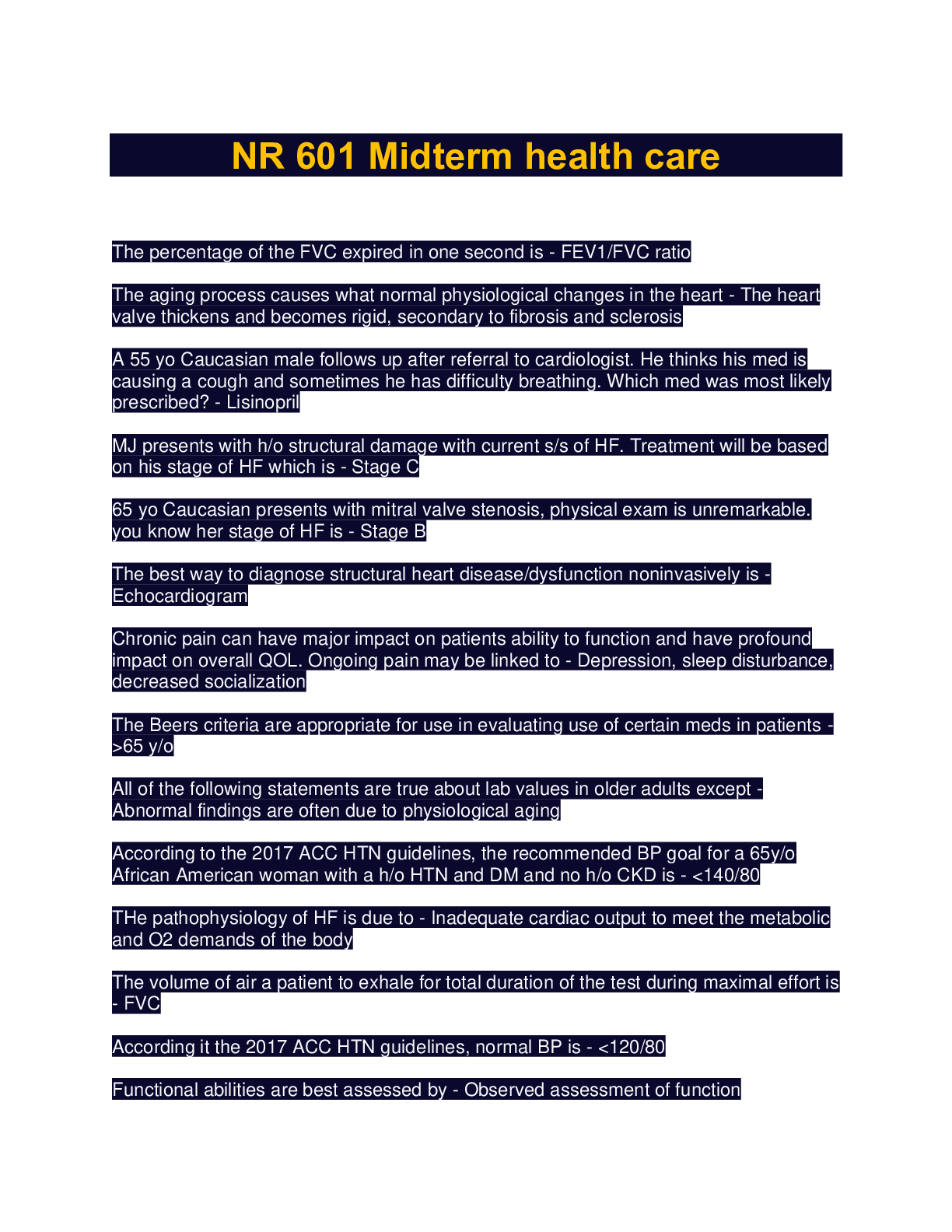

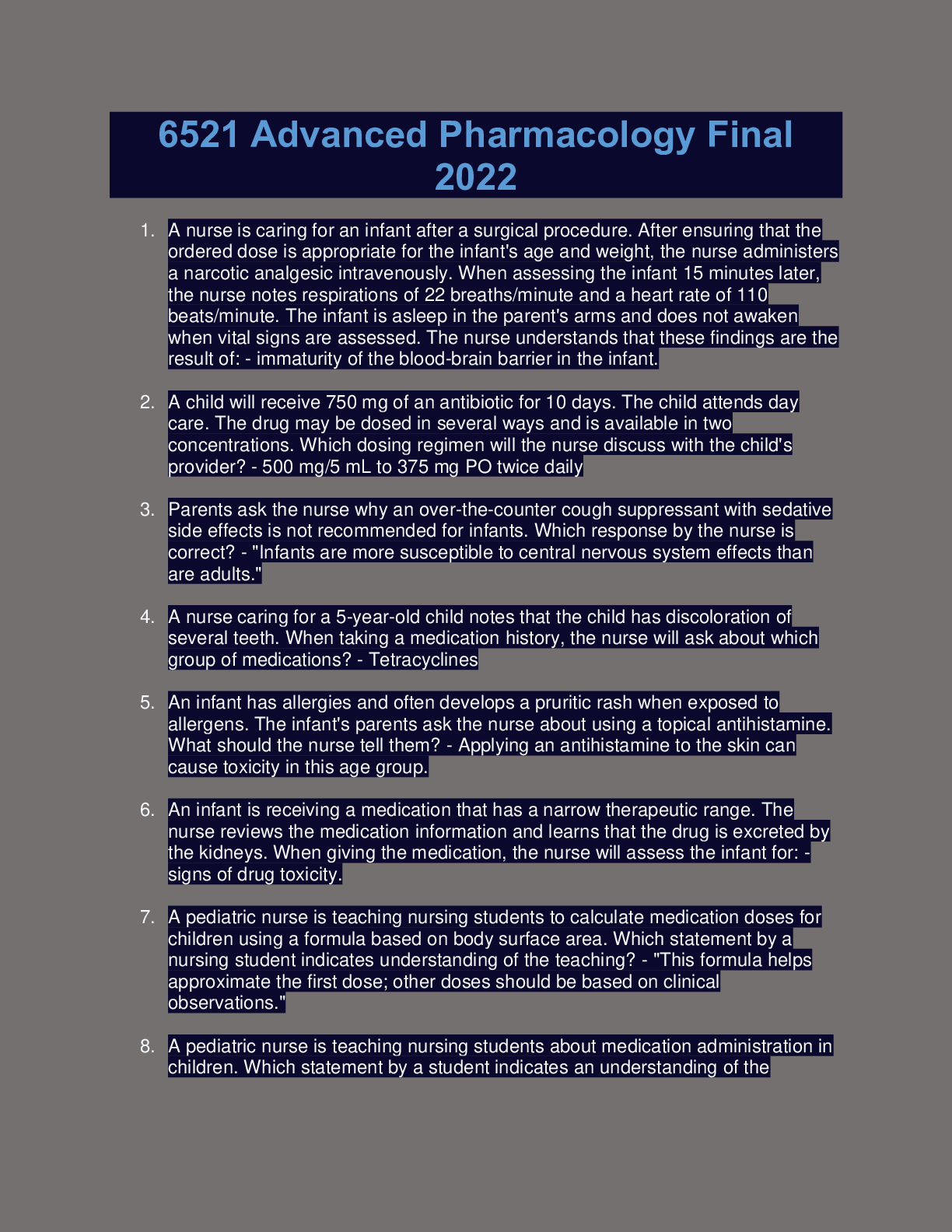
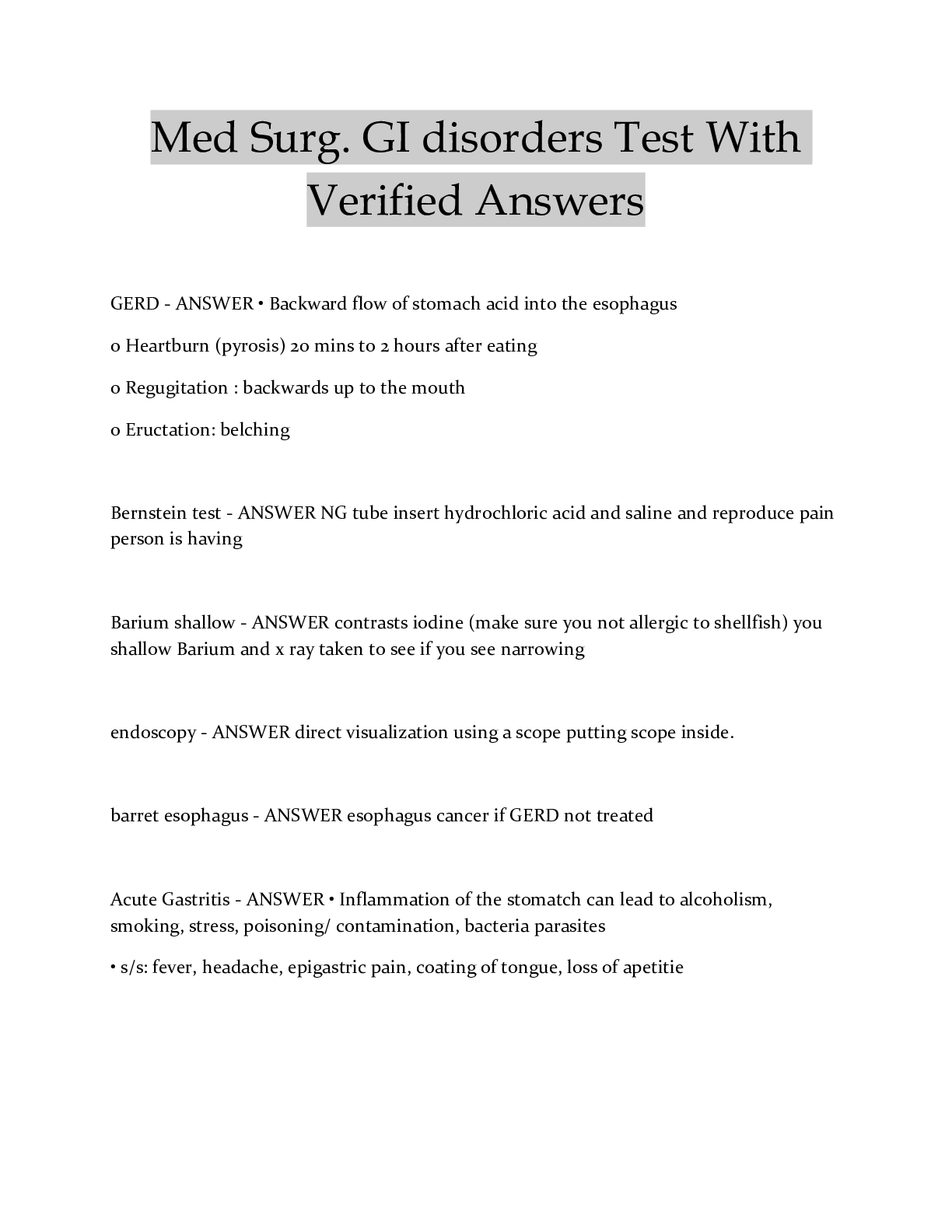

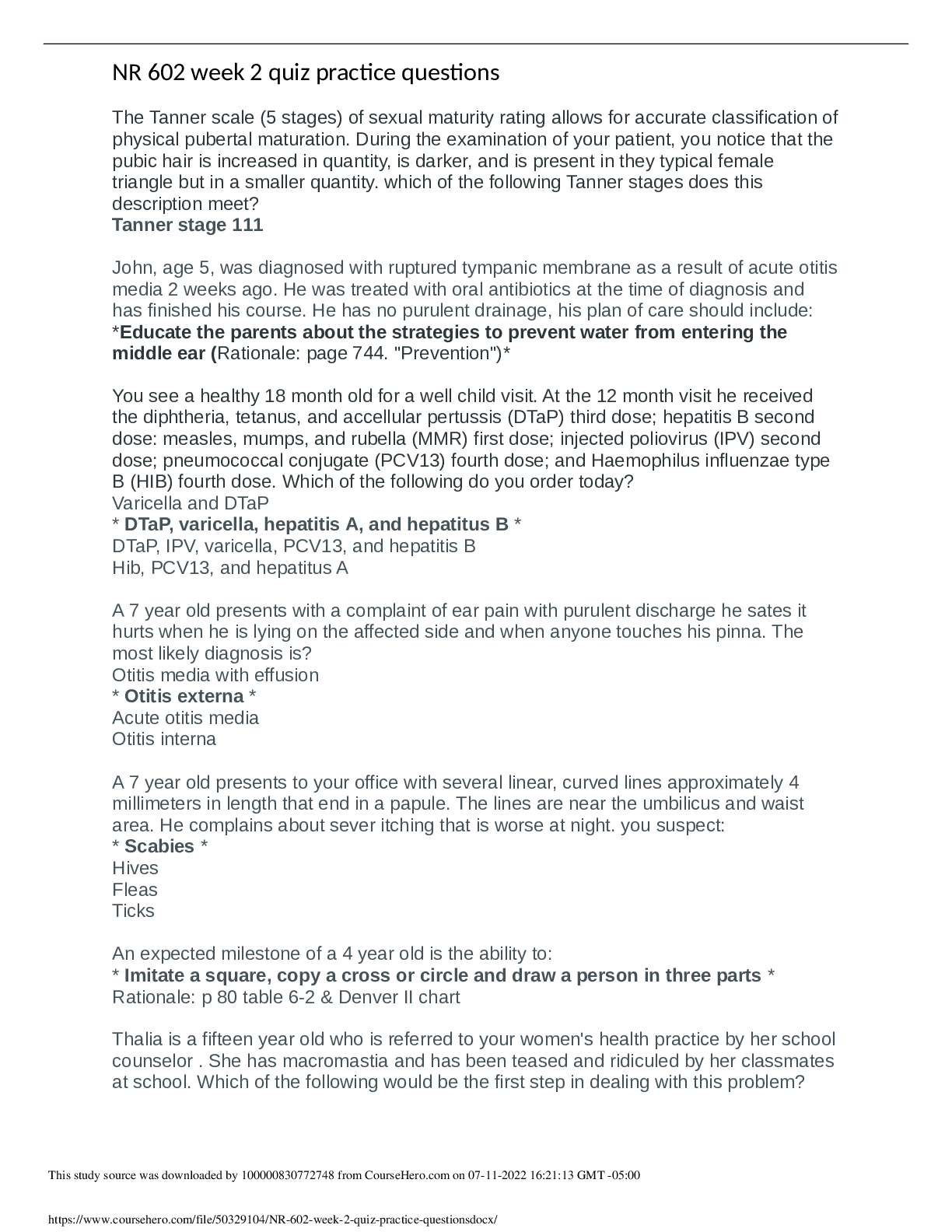
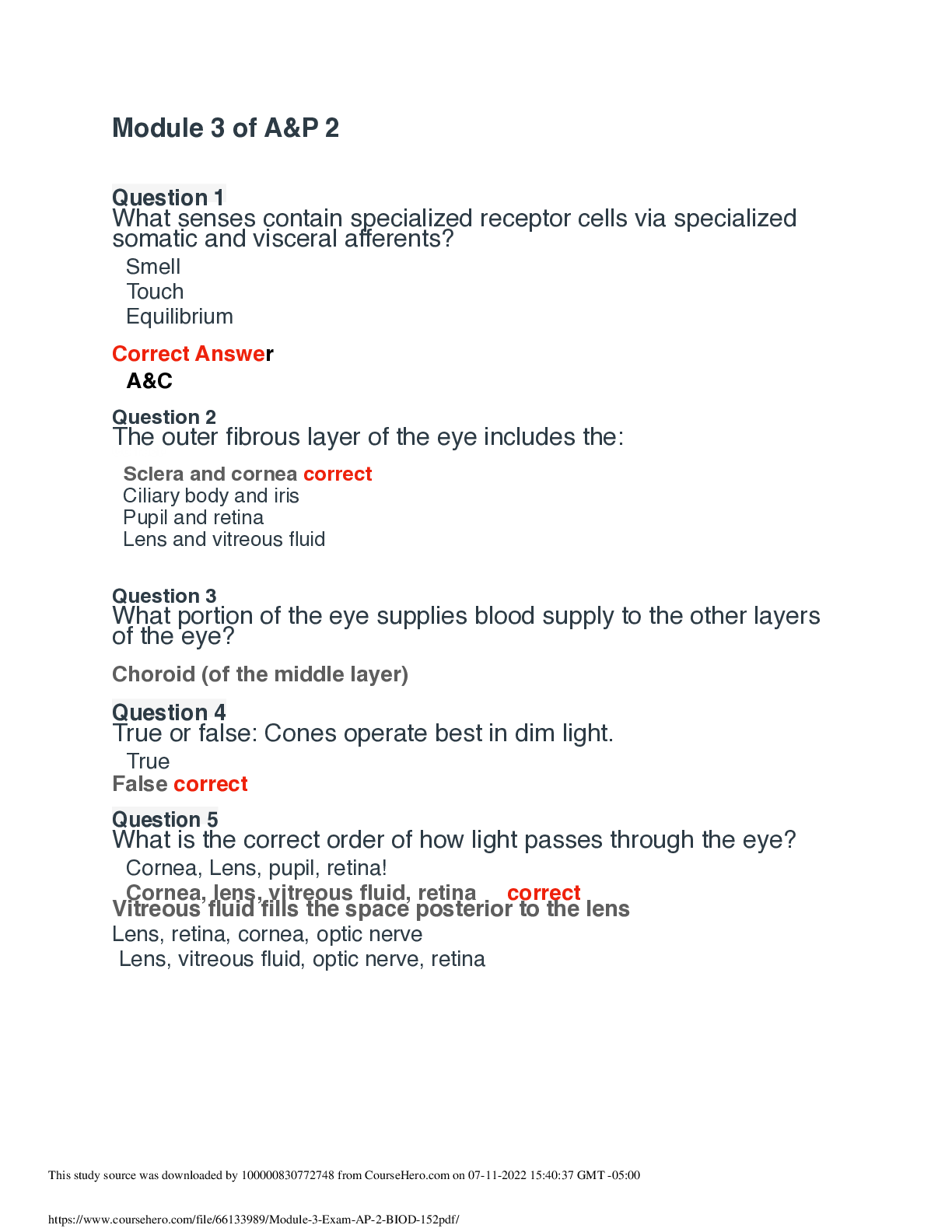
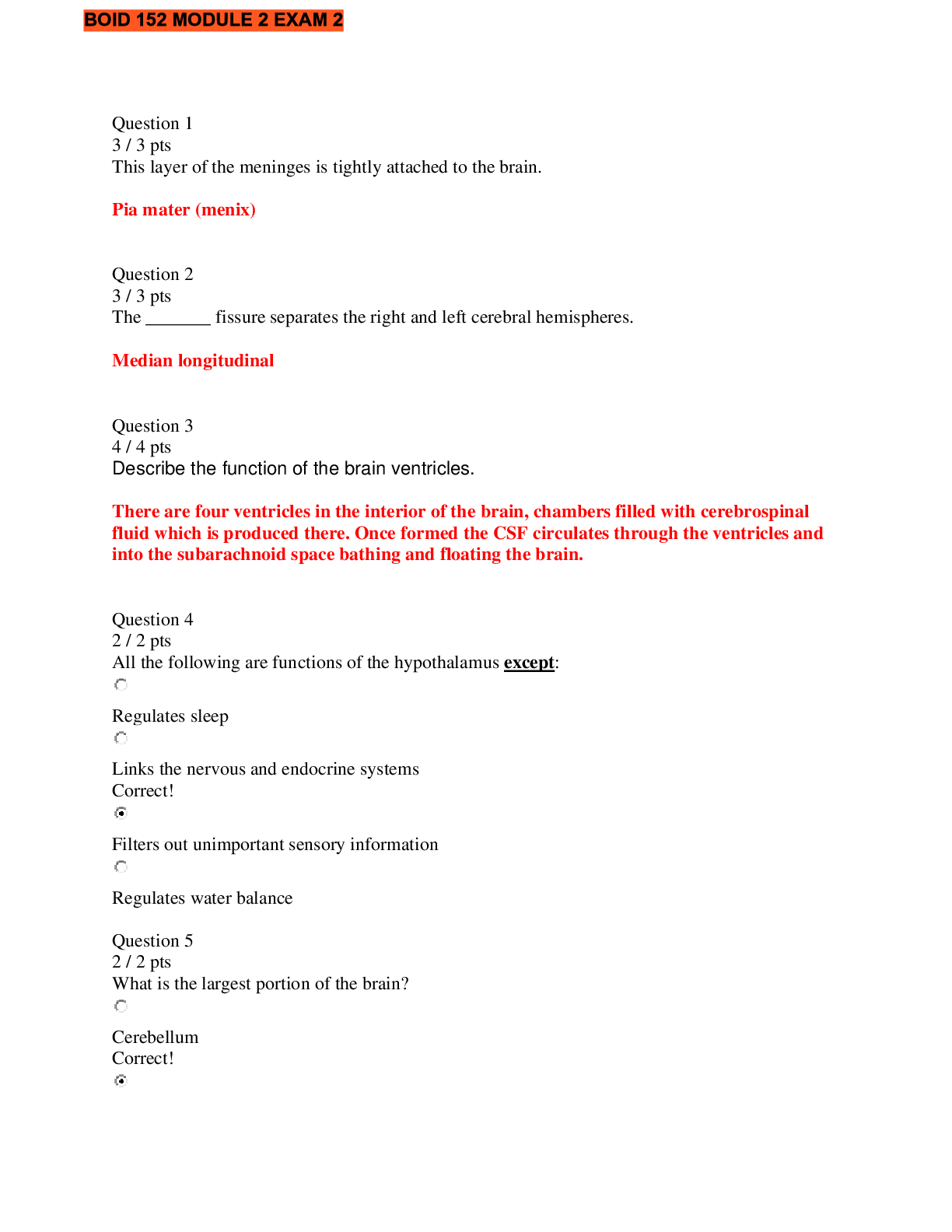

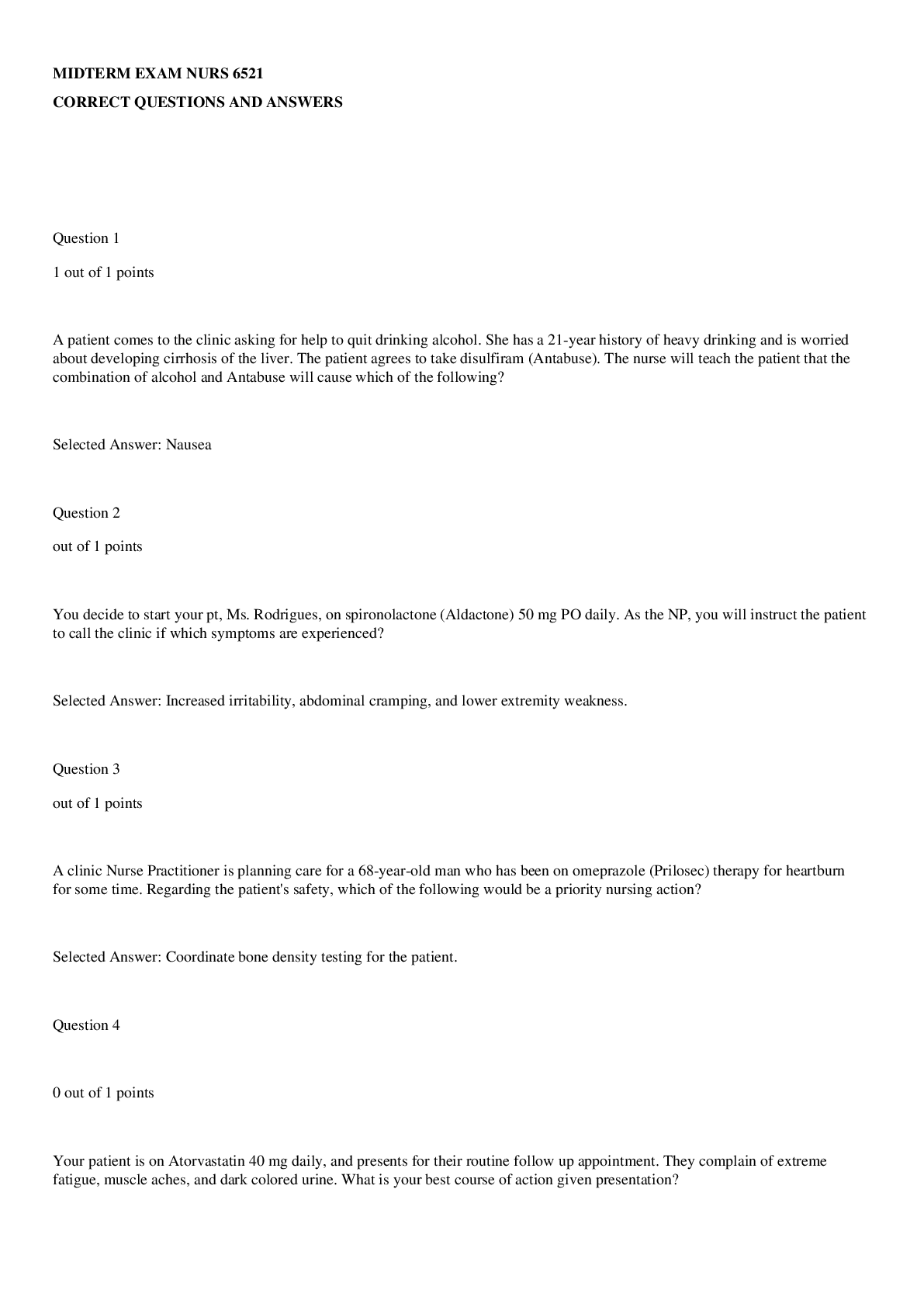
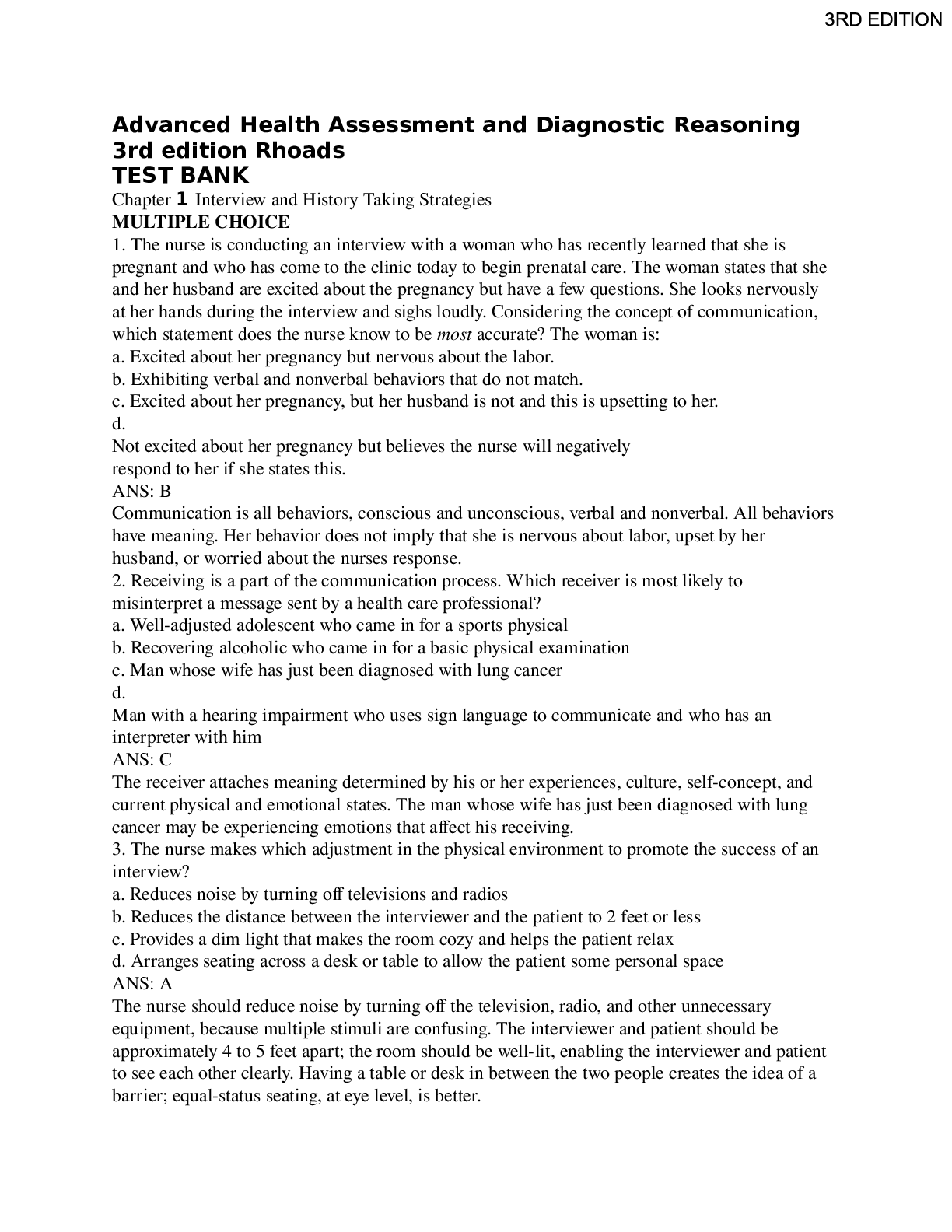
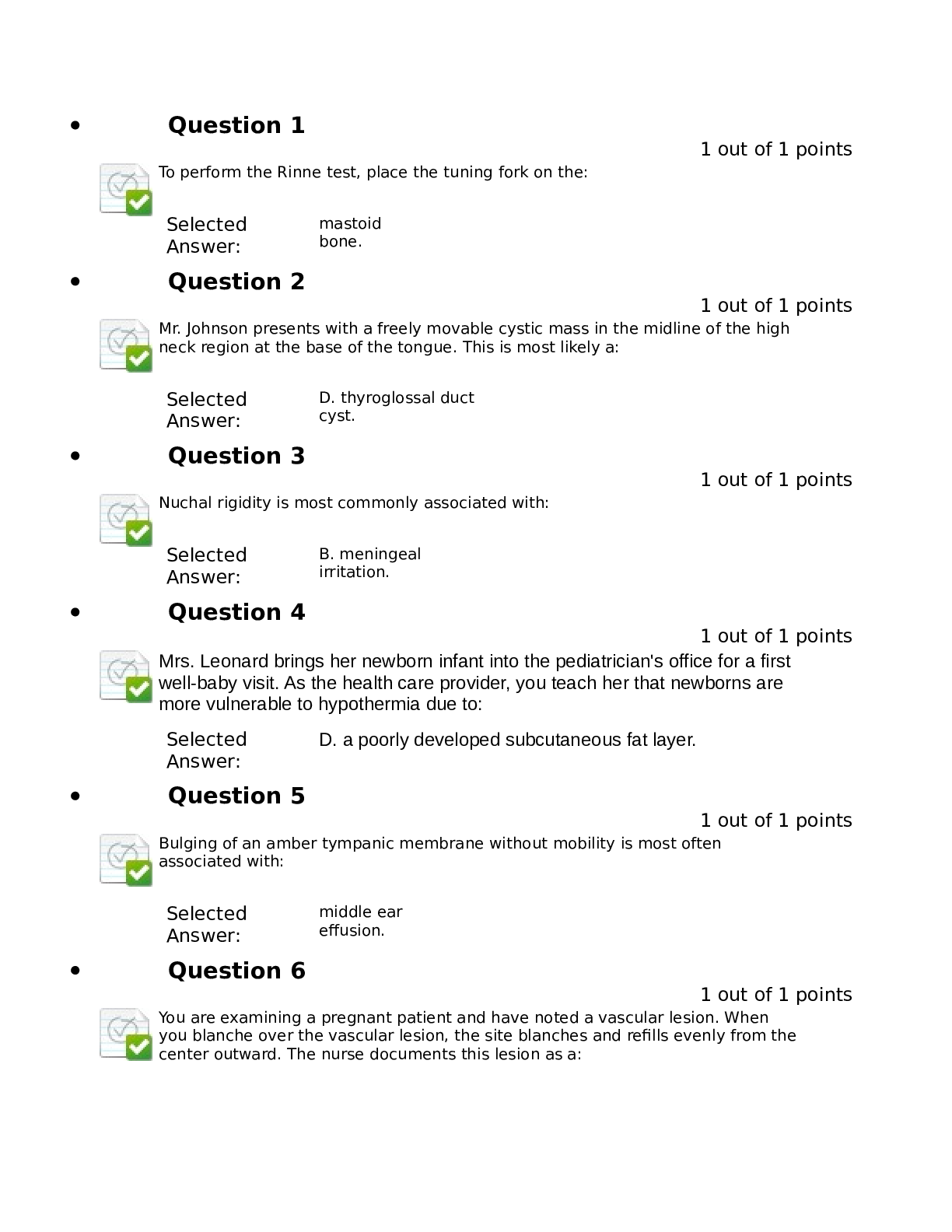
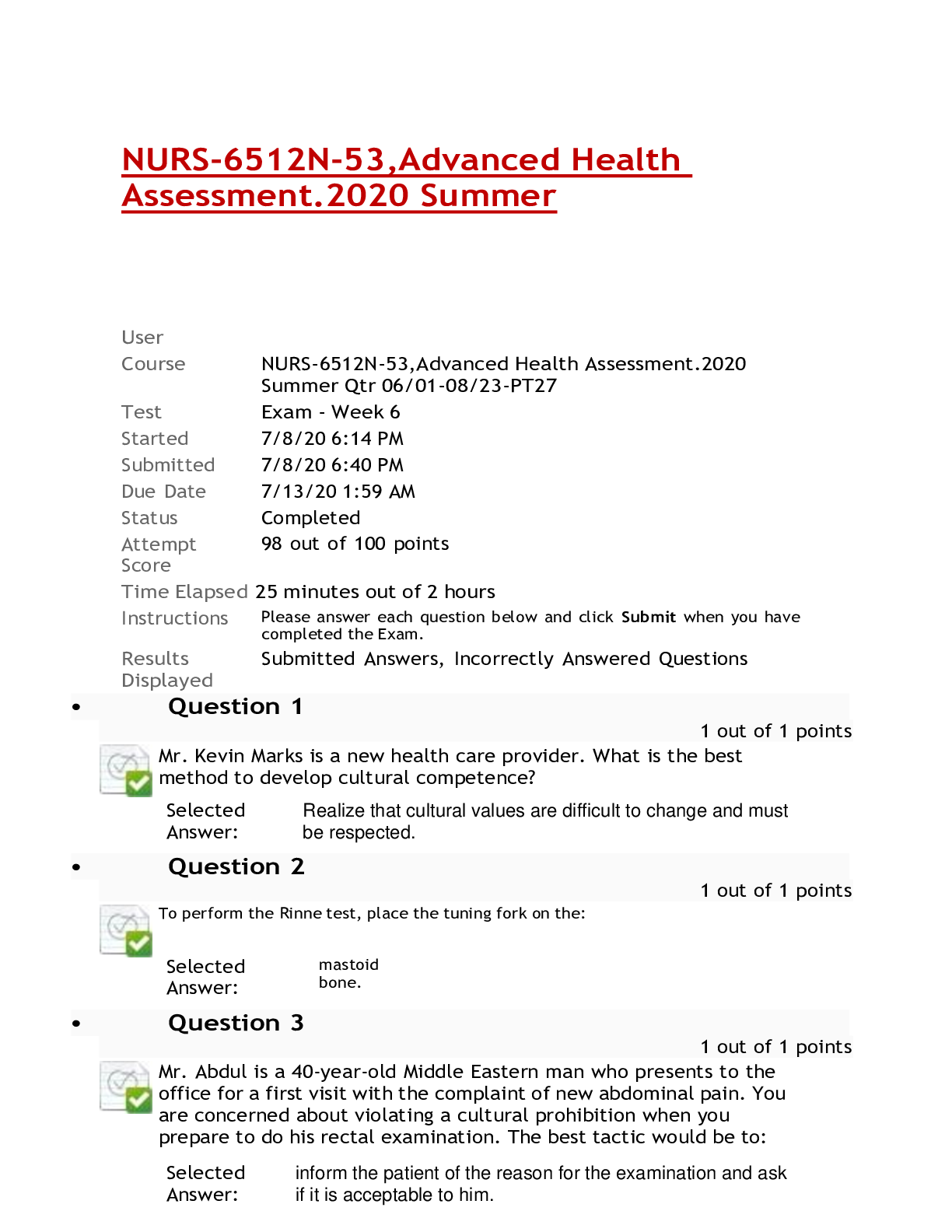
.png)
.png)

.png)
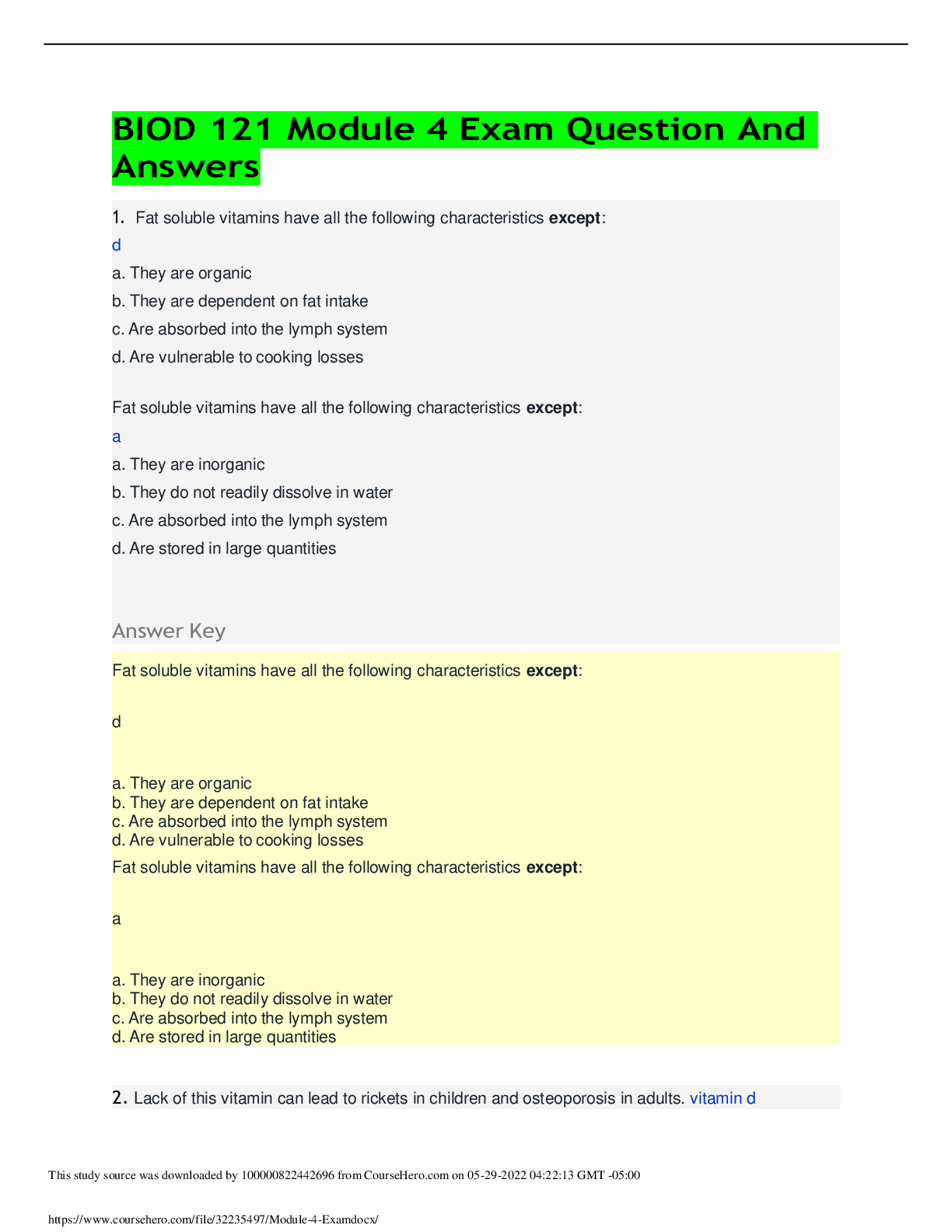
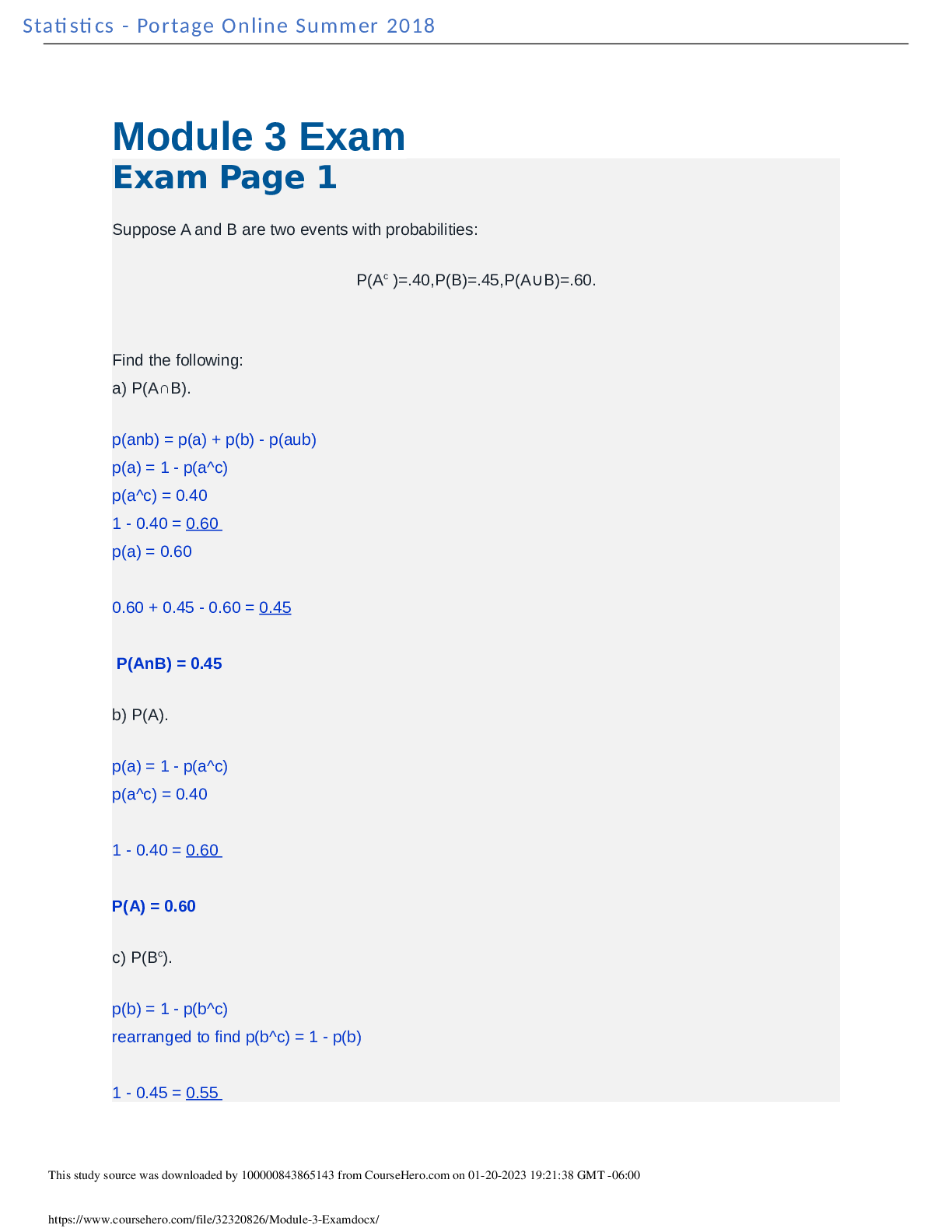
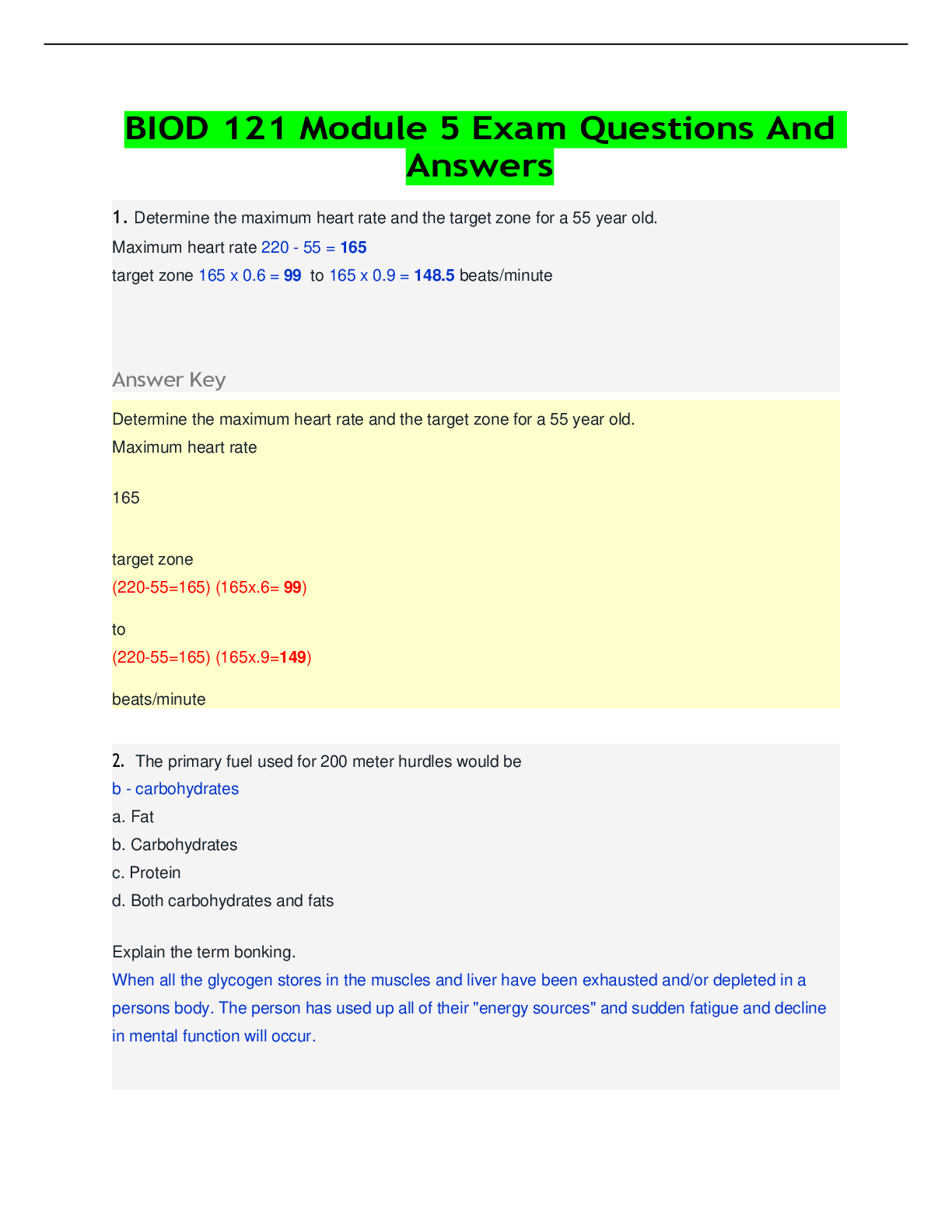

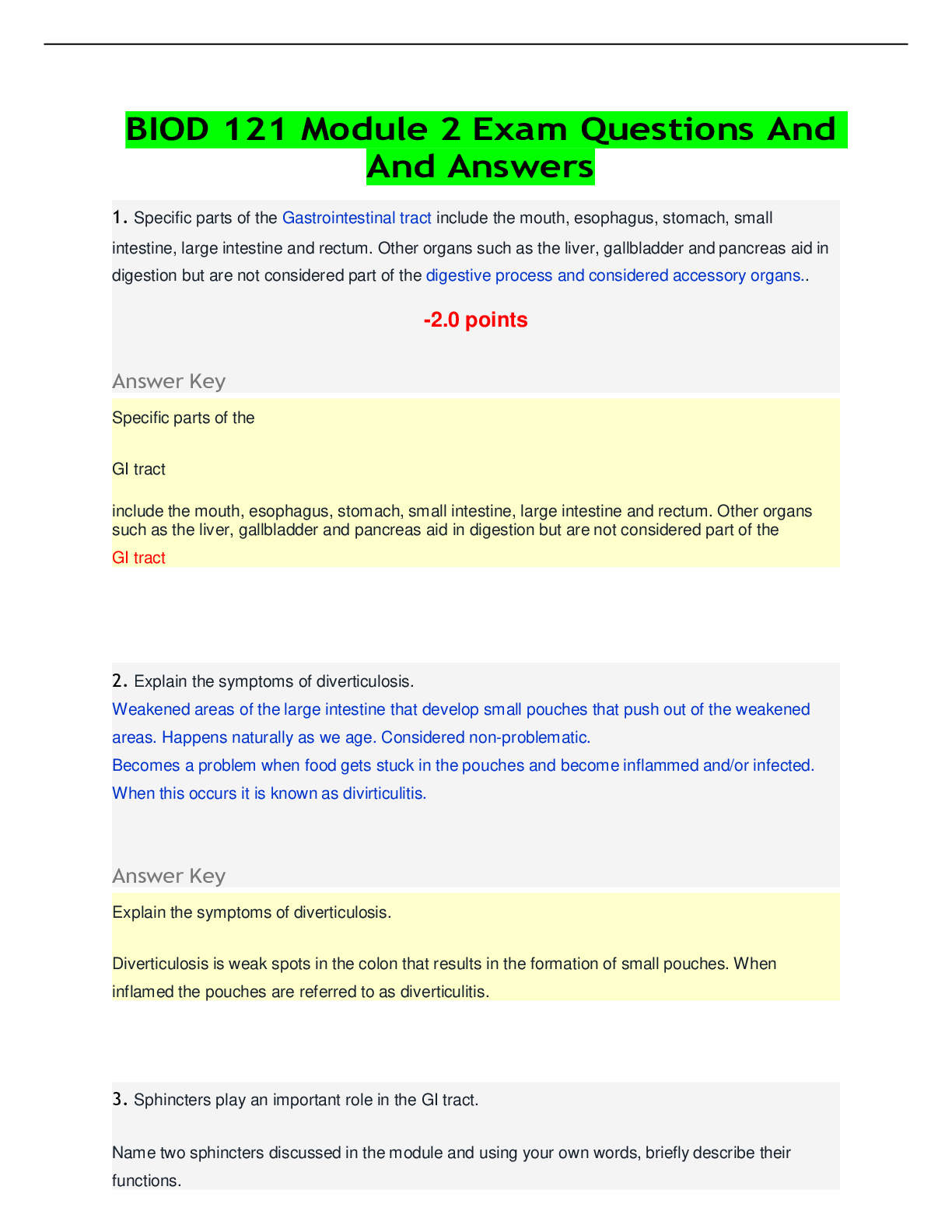
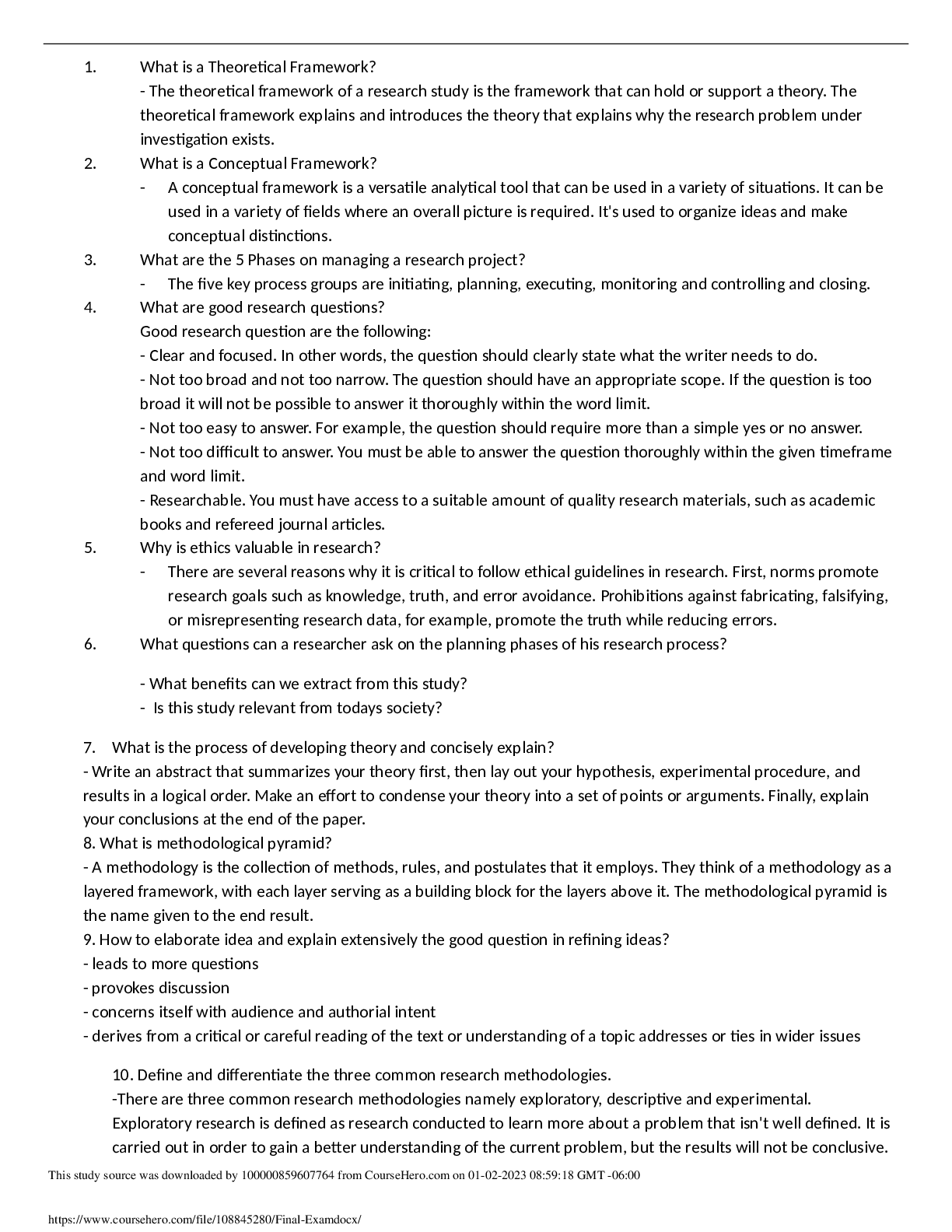
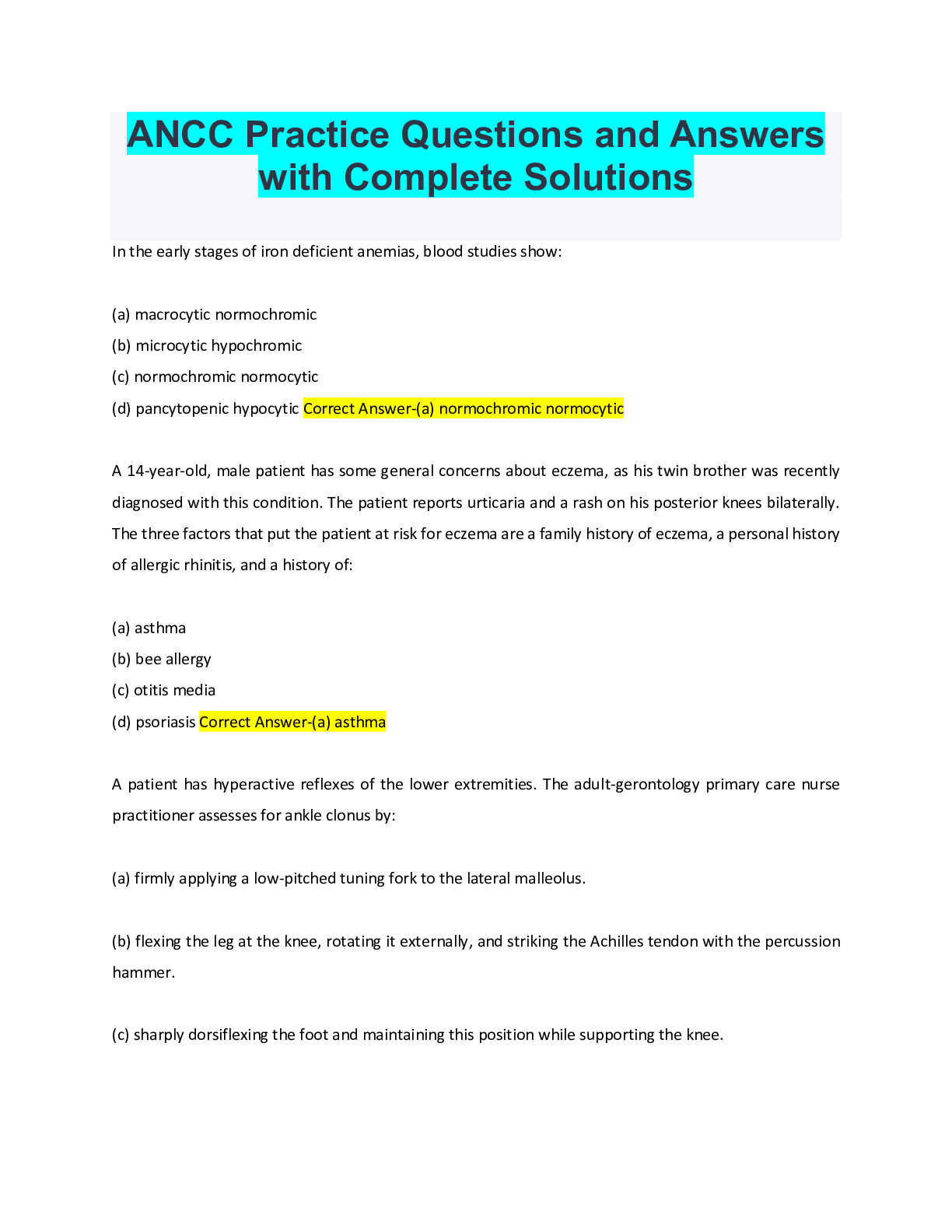
.png)
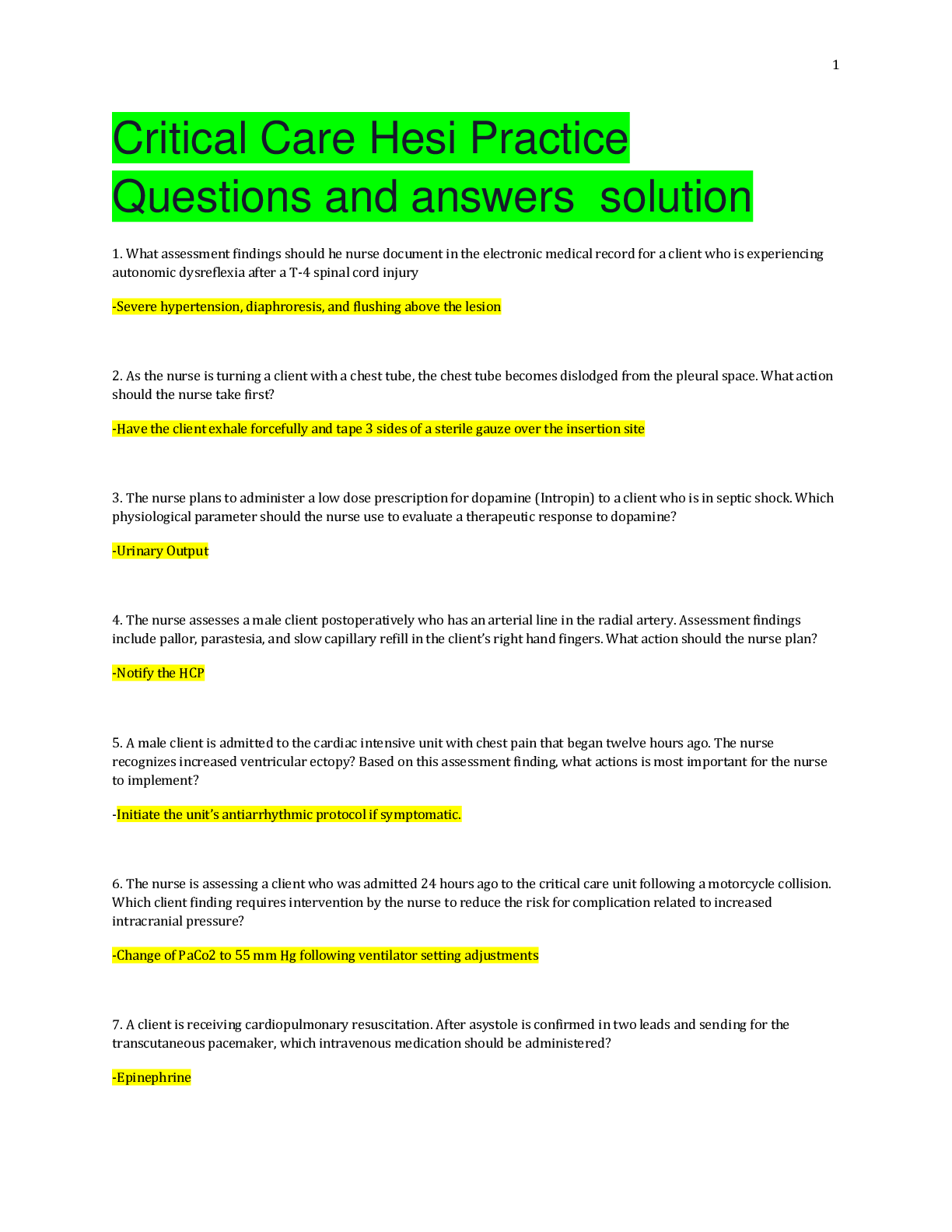
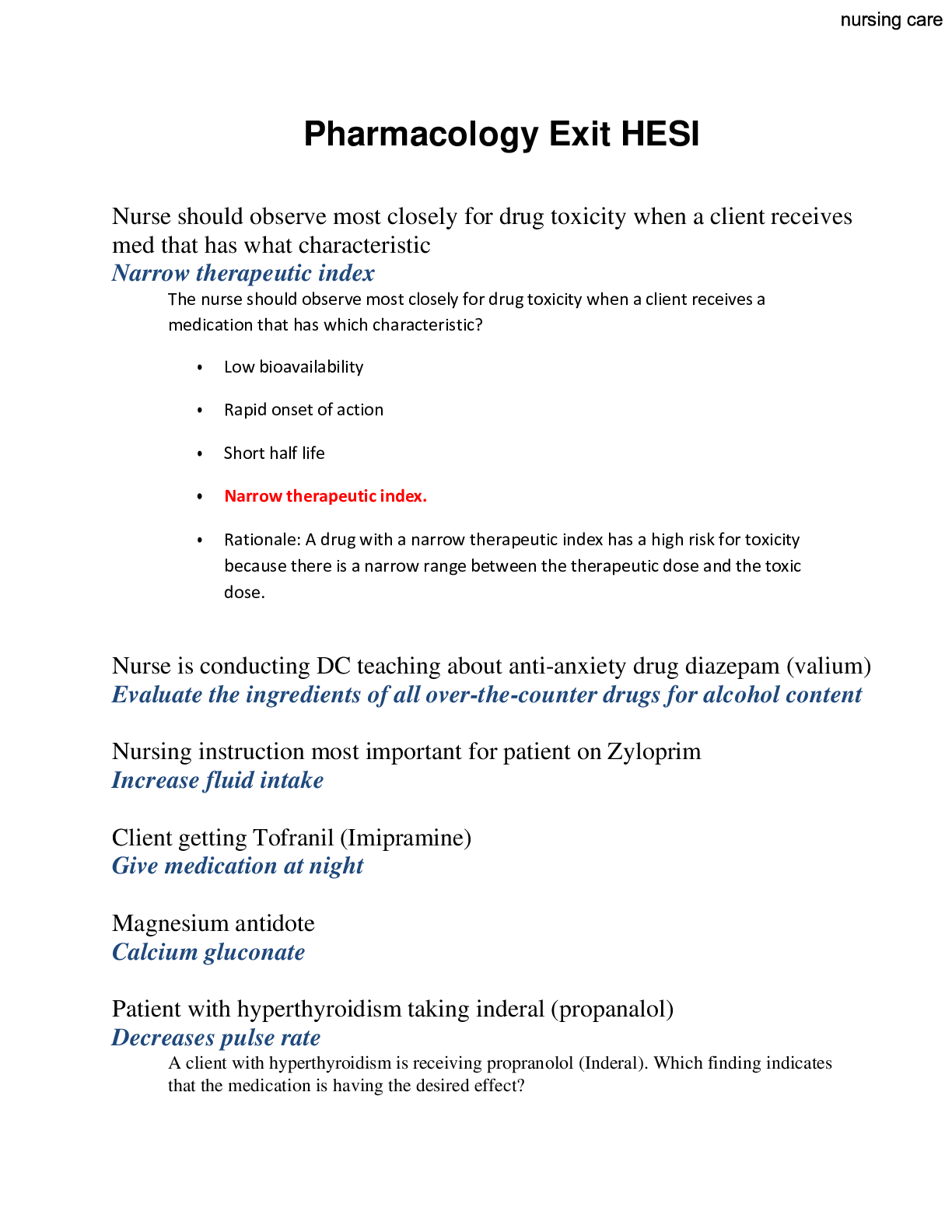
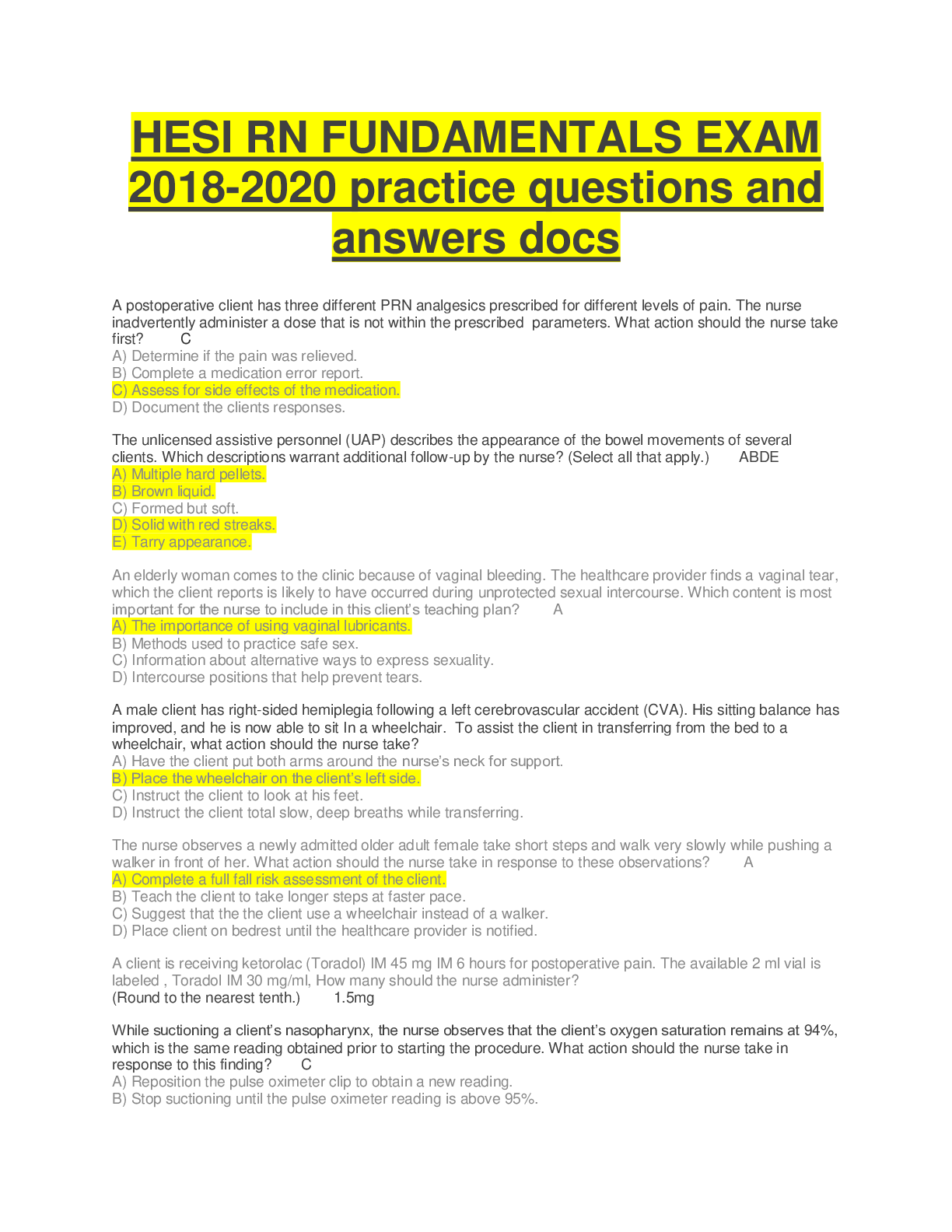
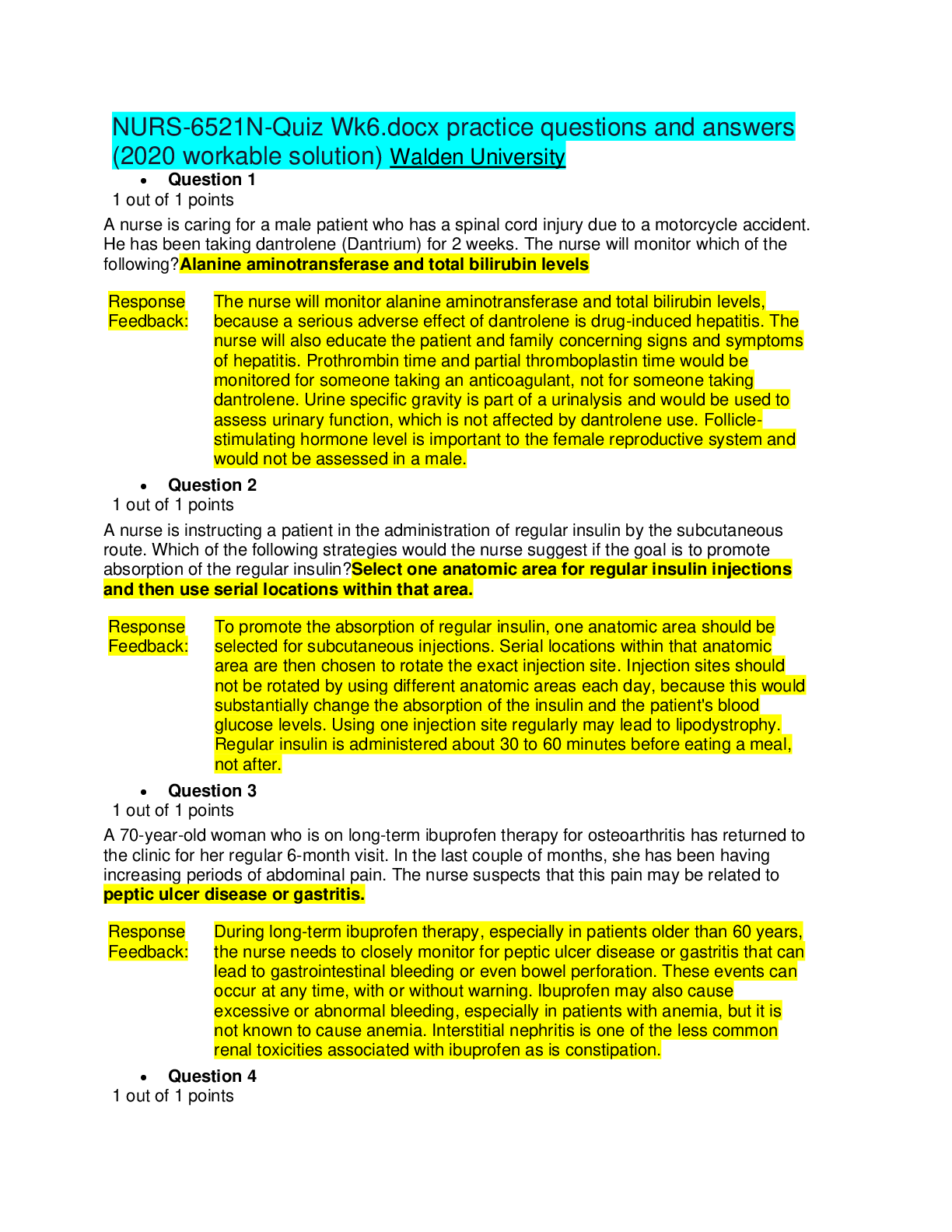

.png)
